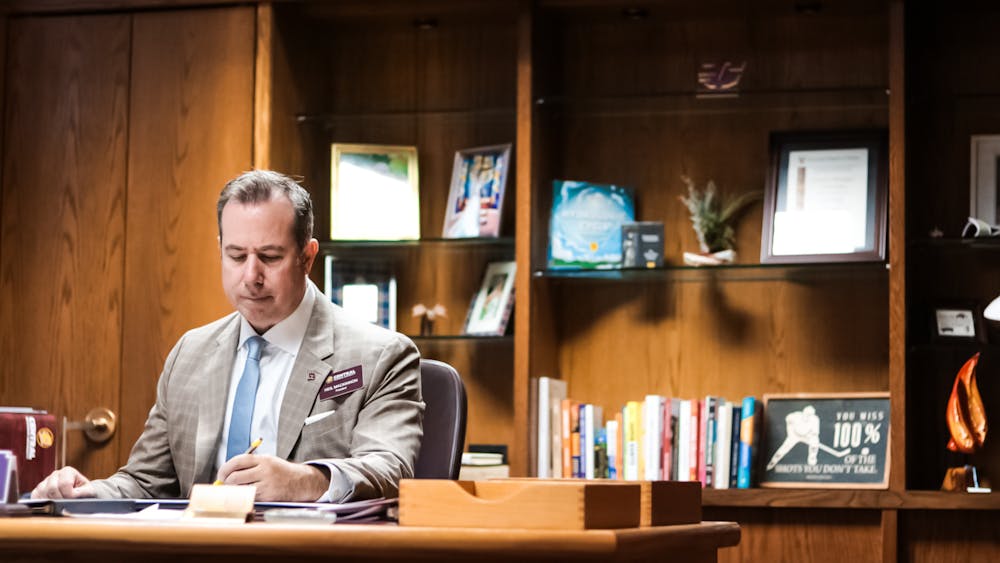'Ask Answergirl': An audio drama for amateur sleuths stuck at home

When “Ask Answergirl,” an audio drama produced by students and faculty at Central Michigan University, was released in the fall, the world still had months before it would be impacted by the COVID-19 pandemic.
Now the show’s creator, broadcast and cinematic arts professor Will Anderson, hopes that its breezy, light-hearted mysteries can find an audience among quarantined families and individuals looking for a 15-minute getaway into a world of academic misconduct.
The 11-episode series revolves around the character Zina Roberts, an advice columnist at her university’s student newspaper, who helps the dean get to the bottom of suspected cheating and honor code violations. In each episode, Roberts balances her time between hitting deadlines and turning in cheaters.
While the series could be called “family-friendly,” and could supplement a newfound home-schooling curriculum, Anderson said, he thinks there’s enough to it that it can engage people of any age.
“It’s something that everyone can listen to, but it’s sure not dumbing things down," he said.
Anderson wrote the first iteration of “Ask Answergirl” for a contest about seven years ago. Over a lunch of Thai food in 2018, Anderson revisited the premise with his office neighbor, BCA professor Chris Csont. He’d been writing audio dramas for around 20 years, describing it as his “one parlor trick in (his) skills bag.” Csont had mostly written screenplays, never an audio drama.
Using a $20,000 grant from the College of Arts and Media, which aimed to foster collaboration between departments, they bought out two courses that Csont and theatre and dance professor Keeley Stanley-Bohn would have taught, allowing them to focus on the project. By the end of Fall 2018, Anderson had written a pilot episode and Csont had written four more, including the finale.
The following spring, Csont recruited five students he’d worked with in broadcast writing classes who were “hungry for a project,” he said. The students met regularly in a “writers’ room” setting, gathered in a circle around a whiteboard of ideas and potential storylines. Episodes six through ten were each written by one of the five students.
To brainstorm new mysteries, they considered the challenges that would drive a college student to cheat the system.
Breckenridge senior Reed Schmitz, who wrote the eighth episode, said his script was inspired by a friend who worked at the CMU Help Desk.
“They mentioned to me that if they wanted to, at any time they could go into someone's account at CMU and erase any record of them ever having attended the university,” he said. “This evolved into the slightly less extreme crime perpetrated in the episode itself.”
Being part of a writers’ room was a new, but uniquely challenging, experience, some student writers said.
“It was really fun to work with a group of writers and figure out how to build a world and tell a long-term story together,” Schmitz said. “I've wanted to be a part of a writer's room since I was in high school, so this was a really cool experience for me.”
St. Louis senior Megan Guajardo, who wrote the tenth episode, focused on post-production editing while attending CMU, but working on “Ask Answergirl” led her to “fall in love” with creative writing.
“I took a creative writing class after those experiences and fell deeper in love,” she said. “It was a really great experience to watch something be created from the ground up.”
The names listed in the credits of each episode are largely CMU students and faculty, from the voice talent to the writers, to audio engineer Brittney Antonelli, an alumna.
“I really want to stress how impressed I was with the writers and the performers who came from Central,” he said. “It was really great to watch all of these students show their stuff and come into their own with their ability to create something they get to own, that’s their work.”
Being able to pay people to produce an audio drama was enough of a reward, Anderson said, to make up for the fact that he didn’t make any money off of it.
“It’s a cool CMU thing,” he said. “It’s something nobody else is doing, to the best of my knowledge. Very few people are writing family-friendly audio drama.”
“Ask Answergirl” is available for streaming on CMU’s website as well as through iTunes and the iPhone’s Podcasts app. The series aired on WMHW-FM, the student-run radio station, during CMU and You Day and five episodes aired on “Midnight Audio Theatre,” an audio drama radio show, in Columbus, Ohio.






